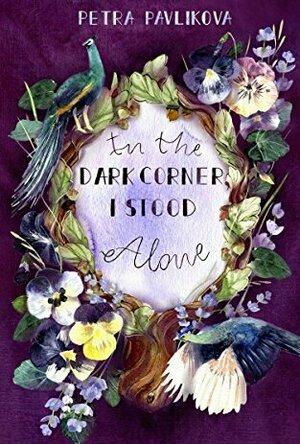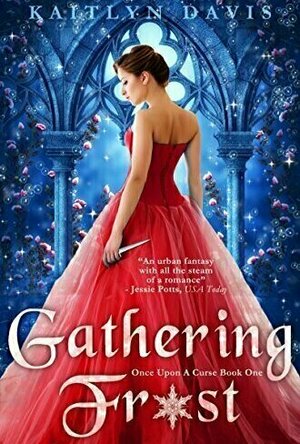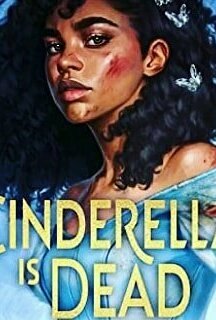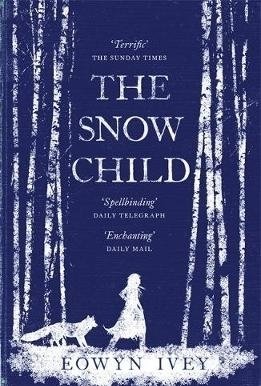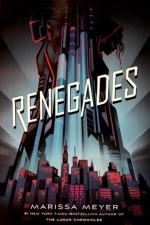Search
Neon's Nerd Nexus (360 KP) rated The Call Of The Wild (2020) in Movies
Feb 22, 2020 (Updated Feb 23, 2020)
A Sheep In Wolf's Clothing
Call Of The Wild is such a lovely heartfelt movie that will leave everyone that goes to see it with that warm tingly feeling inside their chest and a nice big smile on thier face. Ive seen this film is getting a lot of hate because of its over reliance on cgi animals and while I will admit I found it very distracting to start with after 10 minutes I became accustom and think the movie is much better for using it. Why you ask? well the movie to me is obviously aimed at children and the over all feel of it to me was very much like a classic Disney animated cartoon. Let me explain, theres just something so lovely, peaceful and magical about the whole thing and the way its structured, how exaggerated the characters are, the world it builds and the story. See they all just all come together to give you those same feelings you had when you watched a fairytale like beauty and the beast for the first time. Having the dog be cgi lets him have more cartoonish/exaggerated animations and a way more expressive face really helps us to relate to him better, clearly see how hes feeling and to add to this constant sense of warmth/magic thats present throughout. Theres also a fantastic sense of adventure here and the film uses stunning locations to constantly wow us and keep us in this picturesque perfect dream or tranquil fantasy kind of state. Harrison ford is splendid here playing a lonely man whos almost given up hope of being truly happy until Buck comes along. His perfomance is so touching and you can clearly hear in his Blade Runner style narrations the sadness and pain in his heart which immediately helps you to feel sympathy towards him. Bucks story is equally as sad too, he longs to be part of a pack/family of his own and to one day become a leader answering to no one but himself. His motivations are shown in the form of a powerful and strong black wolf that keeps his confidence up and his determination strong and theres so many messages about never giving up, pushing forward and trusting in your destiny too that its hard not to become fully engrossed in his journey. It may be a simple tale but its an absolute joy to watch and its motivational themes are guaranteed to make anyone think positively about thier own life while watching. I also can not go without mentioning Dan Stevens, boy is this guy talented. His acting here is devilishly cartoonish, over the top wicked and had me grinning constantly in pure delight. Call Of The Wild is an all out beautiful, fun, adorable and exciting adventure for all the family to enjoy and I can not wait till it comes out to buy on 4k.
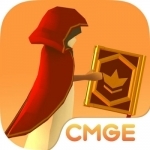
Uri: The Sprout of Lotus Creek
Games, Entertainment and Stickers
App
Published by Fantastic Games Introduction Designed by DreamTree Games (An indie games studio in...
Phillip McSween (751 KP) rated The Hate U Give (2018) in Movies
Feb 11, 2019
Masterpiece, One of the Best of 2018
After witnessing a murder, black high school student Starr Carter (Amandla Stenberg) decides to stand up against racism while dealing with her own internal conflict of self-identity.
Acting: 10
Beginning: 8
The toughest part about critiquing is having to say something isn’t perfect, but not really having any ideas as to how to fix it. The beginning was…good. Characters are introduced as you meet the Carter family for the first time. It definitely could have been better, however. I felt it dragged on for slightly too long, but at the same time I understand director George Tillman Jr. was going for an emotional connection. While it could’ve been better, it is solid enough of a start to get you into the movie.
Characters: 10
The film revolves around Starr and her family. Each family member contributes to the overall dynamic of the story. You can see how Starr is shaped by her strong father Maverick (Russell Hornsby) who is all about standing up for what’s right and protecting the family at all costs. Her mother Lisa (Regina Hall) just wants Starr to have a better life than herself growing up. Starr recognizes that and tries to embrace it, but also feels guilty while doing so. It was therapeutic watching Starr evolve into a woman after feeling so powerless in the earlygoings of the film. All of these characters, even those outside of the Carter family, have depth and add value to the story.
Cinematography/Visuals: 10
Conflict: 10
Genre: 8
Memorability: 10
The Hate U Give is packed with twists and turns that you don’t expect or see coming. It really is a small world that we live in, too small to go around hating each other. The film succeeds by showing us just how small this world is. There are a number of memorable scenes that remain etched in my brain long after watching the movie. It’s one of those films that stays with you, leaving you with cause for much thought.
Pace: 9
There were a few spots where the build-up was a bit slow, but it’s not a major issue that impacts the movie as a whole. This goes back to what I was mentioning in the beginning. Not perfect, but I’m not sure how much I would have done differently than Tillman Jr. For the most part, the movie is highly entertaining and has a consistent flow.
Plot: 10
Resolution: 10
Ended just the way it should, not with some fairytale conclusion, but reality. Thank God for justice, but the movie leaves us with the full understanding that there is still work yet to be done. Very strong messaging.
Overall: 95
The Hate U Give is not your typical race war movie as it pushes for peace in coexistence and challenges the ideas of self-identification. The dynamics involved here are truly interesting as you see a black vs. white vs. hood life going on and what happens when lines cross. With a solid cast and story, it is not a surprise that this is one of my favorite films of 2018.
Acting: 10
Beginning: 8
The toughest part about critiquing is having to say something isn’t perfect, but not really having any ideas as to how to fix it. The beginning was…good. Characters are introduced as you meet the Carter family for the first time. It definitely could have been better, however. I felt it dragged on for slightly too long, but at the same time I understand director George Tillman Jr. was going for an emotional connection. While it could’ve been better, it is solid enough of a start to get you into the movie.
Characters: 10
The film revolves around Starr and her family. Each family member contributes to the overall dynamic of the story. You can see how Starr is shaped by her strong father Maverick (Russell Hornsby) who is all about standing up for what’s right and protecting the family at all costs. Her mother Lisa (Regina Hall) just wants Starr to have a better life than herself growing up. Starr recognizes that and tries to embrace it, but also feels guilty while doing so. It was therapeutic watching Starr evolve into a woman after feeling so powerless in the earlygoings of the film. All of these characters, even those outside of the Carter family, have depth and add value to the story.
Cinematography/Visuals: 10
Conflict: 10
Genre: 8
Memorability: 10
The Hate U Give is packed with twists and turns that you don’t expect or see coming. It really is a small world that we live in, too small to go around hating each other. The film succeeds by showing us just how small this world is. There are a number of memorable scenes that remain etched in my brain long after watching the movie. It’s one of those films that stays with you, leaving you with cause for much thought.
Pace: 9
There were a few spots where the build-up was a bit slow, but it’s not a major issue that impacts the movie as a whole. This goes back to what I was mentioning in the beginning. Not perfect, but I’m not sure how much I would have done differently than Tillman Jr. For the most part, the movie is highly entertaining and has a consistent flow.
Plot: 10
Resolution: 10
Ended just the way it should, not with some fairytale conclusion, but reality. Thank God for justice, but the movie leaves us with the full understanding that there is still work yet to be done. Very strong messaging.
Overall: 95
The Hate U Give is not your typical race war movie as it pushes for peace in coexistence and challenges the ideas of self-identification. The dynamics involved here are truly interesting as you see a black vs. white vs. hood life going on and what happens when lines cross. With a solid cast and story, it is not a surprise that this is one of my favorite films of 2018.
EmersonRose (320 KP) rated In The Dark Corner I Stood Alone in Books
Nov 20, 2019
I stood alone in a dark corner. My imagination ran wild.”
In the Dark Corner, I stood Alone is a collection of short stories by author Petra Pavlikova, published on June 12th, 2018. These short stories pull together themes of women and fairytales. Telling stories about strong women in stressful situations, difficult because they are real, and how these women pull through, with a healthy dose of the fantastical. The collection itself is a short and easy read as the stories range in length from 5-20 pages each. I loved the beautiful imagery created in these stories as they each take you on fantastic journeys.
The characters in these stories are such strong and relatable women that I fell in love with each one as I read their story. From beginning to end this book captured this beautiful whimsey that kept me captivated in each story. As you read, each has a distinctive story to tell, but they are all in the same unique voice that has a charming but straightforward tone that captures the fairytale quality splendidly. I think that my favorite story may be The Smell of Sweet Lavender, as it tackles a heart-wrenching tale of trying to be true to yourself and the cost it sometimes has on those that you love most. But each was so unique that they held different messages and meanings to them, that I could see myself having a different favorite depending on what mood I was in at the time. This is definitely one of those books that I could see myself re-reading whenever I just wanted to curl up with a sweet set of stories that allow my imagination wander in the realm of fairies and distant kingdoms. The magic in them creates a tone but the themes within them last without extra flare, making them that much more poignant.
The other thing that makes this book really stand out is the remarkable work of the illustrator Anastasia Telegina. From the small flowers and bright colored pages to the exquisite images of the women in the book, the watercolor work is astounding and fits in perfectly with the wanderlust tone of the writing. Each time I saw that stories full image, I was blown away by the beauty and talent. They play with your imagination rather than entirely putting images in your head, keeping the fluidity of the imagination intact while still creating magnificent images. Creating perhaps what is more what a child might imagine from what is described that a realistic picture. This pair clearly makes an excellent team.
These are stories for almost any age in the themes it tackles and the beautiful way in which they are told. While some of the ideas may be intense for a younger audience, the way in which the stories are told make them accessible to any reader. They are important topics dealt with in a way that is natural and very real world, while held within a slightly more fantastical space. I very much enjoyed reading this book and would definitely recommend it. I will be keeping an eye out to read more from this author. Five Stars.
In the Dark Corner, I stood Alone is a collection of short stories by author Petra Pavlikova, published on June 12th, 2018. These short stories pull together themes of women and fairytales. Telling stories about strong women in stressful situations, difficult because they are real, and how these women pull through, with a healthy dose of the fantastical. The collection itself is a short and easy read as the stories range in length from 5-20 pages each. I loved the beautiful imagery created in these stories as they each take you on fantastic journeys.
The characters in these stories are such strong and relatable women that I fell in love with each one as I read their story. From beginning to end this book captured this beautiful whimsey that kept me captivated in each story. As you read, each has a distinctive story to tell, but they are all in the same unique voice that has a charming but straightforward tone that captures the fairytale quality splendidly. I think that my favorite story may be The Smell of Sweet Lavender, as it tackles a heart-wrenching tale of trying to be true to yourself and the cost it sometimes has on those that you love most. But each was so unique that they held different messages and meanings to them, that I could see myself having a different favorite depending on what mood I was in at the time. This is definitely one of those books that I could see myself re-reading whenever I just wanted to curl up with a sweet set of stories that allow my imagination wander in the realm of fairies and distant kingdoms. The magic in them creates a tone but the themes within them last without extra flare, making them that much more poignant.
The other thing that makes this book really stand out is the remarkable work of the illustrator Anastasia Telegina. From the small flowers and bright colored pages to the exquisite images of the women in the book, the watercolor work is astounding and fits in perfectly with the wanderlust tone of the writing. Each time I saw that stories full image, I was blown away by the beauty and talent. They play with your imagination rather than entirely putting images in your head, keeping the fluidity of the imagination intact while still creating magnificent images. Creating perhaps what is more what a child might imagine from what is described that a realistic picture. This pair clearly makes an excellent team.
These are stories for almost any age in the themes it tackles and the beautiful way in which they are told. While some of the ideas may be intense for a younger audience, the way in which the stories are told make them accessible to any reader. They are important topics dealt with in a way that is natural and very real world, while held within a slightly more fantastical space. I very much enjoyed reading this book and would definitely recommend it. I will be keeping an eye out to read more from this author. Five Stars.
Sophia (Bookwyrming Thoughts) (530 KP) rated Gathering Frost (Once Upon a Curse, #1) in Books
Jan 23, 2020
<b><i>I received this book for free from Xpresso Book Tours in exchange for an honest review. This does not affect my opinion of the book or the content of my review.</i></b>
Congratulations, Kaitlyn Davis. I've found my favorite Sleeping Beauty retelling (for now) – FINALLY! (Because a lot of the other retellings I've come across have been Sleeping Beauty, and I've managed to not get along with them.)
The first book in the <i>Once Upon a Curse</i> series is <b>set up in a futuristic New York where two worlds merged as one in an earthquake</b> when Jade was younger. Years later, Jade lives in a world where a queen strips all of the inhabitants' emotions away, leaving them with no emotion. When she comes across the queen's lost son, Prince Asher, the queen sets her on a mission to be captured and trusted by the prince, eventually betraying and returning him back to the queen.
<b>There's something I really liked about <i>Gathering Frost</i> – something that Davis did here that wasn't done in other Sleeping Beauty retellings.</b> I enjoyed the futuristic world Davis creates – two worlds, one of them believed to be parallel to Earth, being merged together and a queen who takes away all emotions from her people, along with the ability to control them. Somehow, throughout all of that, <b>Davis weaves in a bit of Sleeping Beauty and make her own fairytale world as well</b> – I really liked the addition of Jade coming across the original story while staying in the rebel camp.
There's also <b>something about Davis' writing style that I really enjoyed</b>, despite the fact there were a few moments where I started questioning the grammar, or there were commas where there really shouldn't have been any commas, or there were commas thrown in when the sentence would have worked so much better as two sentences. There were some parts that were <b>just written beautifully and flowed together extremely well</b> (read: the beauty of parallel structure).
I honestly can't say too much about the characters, particularly in Jade's case. Since her emotions have been taken away by the queen, <b>it was only natural for Jade to be depicted as a cold, detached, statuesque character and focus mainly on her surroundings.</b> As Jade spends more time in the rebel camp, though, <b>she slowly starts to develop emotions and feelings, and Jade's focus seems to balance out a little with her surroundings, her past, and her newly developed emotions.</b>
With a hint on what the sequel will probably be about, Davis doesn't actually leave us on a major cliffhanger. Instead, she seems to be conveying that <b>Jade's and Asher's story definitely won't be ending with <i>Gathering Frost</i></b> – they're more than likely to appear in the second book, and I can't wait to see what Davis comes up with for her retelling of <i>Beauty and the Beast</i>.
<a href="https://bookwyrmingthoughts.com/review-gathering-frost-by-kaitlyn-davis/"; target="_blank">This review was originally posted on Bookwyrming Thoughts</a>
Congratulations, Kaitlyn Davis. I've found my favorite Sleeping Beauty retelling (for now) – FINALLY! (Because a lot of the other retellings I've come across have been Sleeping Beauty, and I've managed to not get along with them.)
The first book in the <i>Once Upon a Curse</i> series is <b>set up in a futuristic New York where two worlds merged as one in an earthquake</b> when Jade was younger. Years later, Jade lives in a world where a queen strips all of the inhabitants' emotions away, leaving them with no emotion. When she comes across the queen's lost son, Prince Asher, the queen sets her on a mission to be captured and trusted by the prince, eventually betraying and returning him back to the queen.
<b>There's something I really liked about <i>Gathering Frost</i> – something that Davis did here that wasn't done in other Sleeping Beauty retellings.</b> I enjoyed the futuristic world Davis creates – two worlds, one of them believed to be parallel to Earth, being merged together and a queen who takes away all emotions from her people, along with the ability to control them. Somehow, throughout all of that, <b>Davis weaves in a bit of Sleeping Beauty and make her own fairytale world as well</b> – I really liked the addition of Jade coming across the original story while staying in the rebel camp.
There's also <b>something about Davis' writing style that I really enjoyed</b>, despite the fact there were a few moments where I started questioning the grammar, or there were commas where there really shouldn't have been any commas, or there were commas thrown in when the sentence would have worked so much better as two sentences. There were some parts that were <b>just written beautifully and flowed together extremely well</b> (read: the beauty of parallel structure).
I honestly can't say too much about the characters, particularly in Jade's case. Since her emotions have been taken away by the queen, <b>it was only natural for Jade to be depicted as a cold, detached, statuesque character and focus mainly on her surroundings.</b> As Jade spends more time in the rebel camp, though, <b>she slowly starts to develop emotions and feelings, and Jade's focus seems to balance out a little with her surroundings, her past, and her newly developed emotions.</b>
With a hint on what the sequel will probably be about, Davis doesn't actually leave us on a major cliffhanger. Instead, she seems to be conveying that <b>Jade's and Asher's story definitely won't be ending with <i>Gathering Frost</i></b> – they're more than likely to appear in the second book, and I can't wait to see what Davis comes up with for her retelling of <i>Beauty and the Beast</i>.
<a href="https://bookwyrmingthoughts.com/review-gathering-frost-by-kaitlyn-davis/"; target="_blank">This review was originally posted on Bookwyrming Thoughts</a>
Lottie disney bookworm (1056 KP) rated Cinderella is Dead in Books
Jun 6, 2020
Contains spoilers, click to show
Thank you to Netgalley and Kalynn Bayron for giving me the opportunity to read an advance copy of Cinderella is Dead in exchange for an honest review.
With such a strong title to a novel, it’s easy to predict that an author would struggle to maintain the sense of danger and mystery that is immediately evoked. However, as Kalynn Bayron opens on the revelation that Cinderella has been dead for 200 years and introduces us to two young women hiding from those who are sure to kill them, I think it is safe to say that she has the drama side of things covered!
The kingdom of Mersaille was once ruled by none other than Prince Charming and Cinderella. After her untimely death, Cinderella’s tale is held in almost biblical stature for generations, with young girls reciting it each night in preparation for their own chance to attend an annual ball once they turn 16 and wishing for their own fairy godmother to grant their happily ever after.
However, as the reader enters the town of Lille 200 years later, we witness that life within the kingdom is far from that of a fairytale. The balls that act as a tribute to Cinderella are mandatory meat markets with lecherous “suitors”, domestic violence and the suppression of women is commonplace and the ruler, Prince Manford, thrives on the power, fear and violence.
The reader witnesses this abysmal society through Bayron’s use of a first-person perspective: that of our protagonist Sophia. Sophia is everything a modern protagonist should be: she questions the unjust world around her and, having just turned 16 is preparing to attend her first ball, not with excitement, but with trepidation.
Sophia reveals to the reader that a girl only has three chances to be chosen by a suitor at the ball, after that she is considered forfeit, taken away from her family in disgrace and placed either into a workhouse or service. Men, however, are under no such conditions: they can attend balls when they wish and can choose a number of girls if they want to. Many girls’ singular hope is to be chosen by a good man at the ball, one who will not beat her, perhaps even one who will take them away from Lille. This is not enough for Sophia, she wants more for her life and, as she says herself:
“I don’t want to be saved by some knight in shining armor. I’d like to be the one in the armor, and I’d like to be the one doing the saving.”
At the beginning of the book, Sophia’s main gripe with the society she lives in is that it will not allow her to be with Erin, the girl she loves. As the book continues, the underlying theme of the rights and treatment of women strengthens, along with Sophia, but the first few pages at least are centered on the teenage relationship between Sophia and Erin.
What I absolutely adored about Bayron’s writing style here is the complete lack of shock or awe in this relationship: it is mentioned right from the start and at no point in this novel does Sophia “come out”, there is simply no need. All those around Sophia, who know her and care for her, are aware of her feelings for Erin and, although Sophia is occasionally referred to as “different”, the author chooses to abolish any unnecessary labels within her novel.
Unfortunately, Bayron does not have an easy ride in store for Sophia: reeling from a firm separation from Erin, Sophia is cast a lifeline, an “easy way out” in the form of a local boy who is also “different”. Sadly, this option is quickly and dramatically ripped away from her: forcing her to find her strength pretty damn quickly as she begins a life as an outlaw.
Along her path, Sophia meets two strong female characters: Constance and Amina. Although, wildly different, both these women play a significant role in Sophia’s self-discovery.
Amina is as far from the traditional fairy godmother image as you can get and, although she feels guilt for her previous actions, it takes meeting Sophia for her to recognise her previous denial and to help change the way of the world. Amina is a protector to Sophia right to the end, in her own unique way.
Constance, what can we say about Constance? I defy anyone to read this book and not fall in love with this girl! Constance possesses the strength that Sophia does not yet recognise within herself; she is fiery and, as a descendant of an “evil stepsister”, leads a resistance movement to uncover and publicise the truth about the real tale of Cinderella. Despite, technically saving Sophia towards the beginning of the story, Constance is not Sophia’s saviour: nor is Sophia the saviour; however, the power that they find together is monumental.
Constance is a complete juxtaposition to Erin: whereas Erin accepts the rules of society out of fear for herself and her family, Constance actively rebels against them. It is almost as if they represent the paths Sophia has to choose from. Nevertheless, along their adventure, Sophia and Constance’s relationship strengthens into love. This is no fairytale, love at first sight deal though! If anything, the slow-burning romance between the two made it more believable and I really appreciated that Sophia didn’t just rebound due to Erin’s choices: she had been burnt and she was still unsure of her own feelings never mind anyone else’s.
At the hands of Bayron, Sophia experiences heartbreak, friendship, murder, love and conspiracy: she is on the brink of danger too many times to count and is constantly second guessing who she can trust. Yet, it is clear that the author adores her main character: Sophia’s journey to realise that she is enough is incredible and the strength that she finds within herself is inspirational. Sophia is also surrounded by a cast of strong female characters: there are no Prince Charming’s in this novel that’s for sure!
I wasn’t that far into this book when I decided I need to read more of Kalynn Bayron’s work. I love how there are no chapters in this novel, we are taken on this relentless journey with Sophia: the reader is not given a chance to stop and take stock, reflect or rest until it is all over and this creates the tensest experience. Even we don’t know who to trust towards the end!
‘Cinderella is Dead’ is powerful, thought-provoking and is constantly leaving the reader guessing. On a basic level the novel deals with violence, love, politics and a little bit of necromancy thrown in there for good measure. However, the intelligent writing as well as the massive plot twist and the subjects of LGBTQ love, women’s rights and domestic violence lifts this novel from that basic level into, what I predict could be a bestseller.
With such a strong title to a novel, it’s easy to predict that an author would struggle to maintain the sense of danger and mystery that is immediately evoked. However, as Kalynn Bayron opens on the revelation that Cinderella has been dead for 200 years and introduces us to two young women hiding from those who are sure to kill them, I think it is safe to say that she has the drama side of things covered!
The kingdom of Mersaille was once ruled by none other than Prince Charming and Cinderella. After her untimely death, Cinderella’s tale is held in almost biblical stature for generations, with young girls reciting it each night in preparation for their own chance to attend an annual ball once they turn 16 and wishing for their own fairy godmother to grant their happily ever after.
However, as the reader enters the town of Lille 200 years later, we witness that life within the kingdom is far from that of a fairytale. The balls that act as a tribute to Cinderella are mandatory meat markets with lecherous “suitors”, domestic violence and the suppression of women is commonplace and the ruler, Prince Manford, thrives on the power, fear and violence.
The reader witnesses this abysmal society through Bayron’s use of a first-person perspective: that of our protagonist Sophia. Sophia is everything a modern protagonist should be: she questions the unjust world around her and, having just turned 16 is preparing to attend her first ball, not with excitement, but with trepidation.
Sophia reveals to the reader that a girl only has three chances to be chosen by a suitor at the ball, after that she is considered forfeit, taken away from her family in disgrace and placed either into a workhouse or service. Men, however, are under no such conditions: they can attend balls when they wish and can choose a number of girls if they want to. Many girls’ singular hope is to be chosen by a good man at the ball, one who will not beat her, perhaps even one who will take them away from Lille. This is not enough for Sophia, she wants more for her life and, as she says herself:
“I don’t want to be saved by some knight in shining armor. I’d like to be the one in the armor, and I’d like to be the one doing the saving.”
At the beginning of the book, Sophia’s main gripe with the society she lives in is that it will not allow her to be with Erin, the girl she loves. As the book continues, the underlying theme of the rights and treatment of women strengthens, along with Sophia, but the first few pages at least are centered on the teenage relationship between Sophia and Erin.
What I absolutely adored about Bayron’s writing style here is the complete lack of shock or awe in this relationship: it is mentioned right from the start and at no point in this novel does Sophia “come out”, there is simply no need. All those around Sophia, who know her and care for her, are aware of her feelings for Erin and, although Sophia is occasionally referred to as “different”, the author chooses to abolish any unnecessary labels within her novel.
Unfortunately, Bayron does not have an easy ride in store for Sophia: reeling from a firm separation from Erin, Sophia is cast a lifeline, an “easy way out” in the form of a local boy who is also “different”. Sadly, this option is quickly and dramatically ripped away from her: forcing her to find her strength pretty damn quickly as she begins a life as an outlaw.
Along her path, Sophia meets two strong female characters: Constance and Amina. Although, wildly different, both these women play a significant role in Sophia’s self-discovery.
Amina is as far from the traditional fairy godmother image as you can get and, although she feels guilt for her previous actions, it takes meeting Sophia for her to recognise her previous denial and to help change the way of the world. Amina is a protector to Sophia right to the end, in her own unique way.
Constance, what can we say about Constance? I defy anyone to read this book and not fall in love with this girl! Constance possesses the strength that Sophia does not yet recognise within herself; she is fiery and, as a descendant of an “evil stepsister”, leads a resistance movement to uncover and publicise the truth about the real tale of Cinderella. Despite, technically saving Sophia towards the beginning of the story, Constance is not Sophia’s saviour: nor is Sophia the saviour; however, the power that they find together is monumental.
Constance is a complete juxtaposition to Erin: whereas Erin accepts the rules of society out of fear for herself and her family, Constance actively rebels against them. It is almost as if they represent the paths Sophia has to choose from. Nevertheless, along their adventure, Sophia and Constance’s relationship strengthens into love. This is no fairytale, love at first sight deal though! If anything, the slow-burning romance between the two made it more believable and I really appreciated that Sophia didn’t just rebound due to Erin’s choices: she had been burnt and she was still unsure of her own feelings never mind anyone else’s.
At the hands of Bayron, Sophia experiences heartbreak, friendship, murder, love and conspiracy: she is on the brink of danger too many times to count and is constantly second guessing who she can trust. Yet, it is clear that the author adores her main character: Sophia’s journey to realise that she is enough is incredible and the strength that she finds within herself is inspirational. Sophia is also surrounded by a cast of strong female characters: there are no Prince Charming’s in this novel that’s for sure!
I wasn’t that far into this book when I decided I need to read more of Kalynn Bayron’s work. I love how there are no chapters in this novel, we are taken on this relentless journey with Sophia: the reader is not given a chance to stop and take stock, reflect or rest until it is all over and this creates the tensest experience. Even we don’t know who to trust towards the end!
‘Cinderella is Dead’ is powerful, thought-provoking and is constantly leaving the reader guessing. On a basic level the novel deals with violence, love, politics and a little bit of necromancy thrown in there for good measure. However, the intelligent writing as well as the massive plot twist and the subjects of LGBTQ love, women’s rights and domestic violence lifts this novel from that basic level into, what I predict could be a bestseller.
Hazel (1853 KP) rated The Snow Child in Books
May 30, 2017
A Fairytale
“Terrific”, “Spellbinding” and “Enchanting” are just three of the many words that critics have used to describe this book; they are also a slight exaggeration. Obviously it is a matter of personal opinion but this novel, whilst having an interesting storyline, was a little too drawn out and, at times… not exactly boring but not all that gripping.
Set in Alaska during the 1920s this is the story of a couple, Jack and Mabel, who, aside from a stillbirth, have not had any children despite their desperate longing. Now that they are both approaching fifty years of age they know that they will never be able to have a son or daughter of their own. One winter, during the first snowfall, the two of them on an uncharacteristic, spur of the moment impulse build a snowman next to their cabin. Rather than building a large snowman they make a smaller one in the shape of a girl, decorating her with scarves and mittens – they have made a snow girl.
Eowyn Ivey has based her novel on a Russian fairy tale, Snegurochka, which in English translates to The Snow Maiden. It was Arthur Ransome’s retelling, Little Daughter of the Snow, which inspired Ivey, but the general storyline is essentially the same, although some versions have alternative endings. For those who are familiar with Snegurochka and its variants will know that it does not end happily therefore it seems inevitable that The Snow Child will head in the same direction. However which ending will it most resemble?
Throughout the novel it is impossible to be absolutely sure that the little girl who turns up outside the cabin the day after the snowman has been built (and destroyed) is in fact the snow girl magically transformed into flesh and bone; or whether it is a lost child and the circumstance are purely coincidental. There is a third option: Jack and Mabel could be imagining things through their desperate longing, but this is easy to rule out.
The snow is understandably a key theme throughout the story. At the beginning the anticipated Alaskan winter is imagined as a “cold on the valley like a coming death”. Not only will it be unbearably freezing, Jack and Mabel will struggle to make do with their limited amount of food and supplies. After the arrival of the child the winter becomes a happy occasion. Jack and Mabel’s relationship improves and they become less isolated after befriending some neighbours. The only heartbreak is when the girl, Faina, disappears in the spring; but as she comes back as soon as it snows, winter becomes something to look forward to. Another snowy link in the story is Faina’s name, which she claims means “the colour on snow when the sun turns” in Russian. This also makes the idea of her truly being the snow girl more convincing.
The novel does predictably have an unhappy ending but the epilogue makes up for this by revealing the contentment of the remaining characters a few years into the future.
As already mentioned, The Snow Child was not a very gripping read, but it was a beautiful tale in the way that fairy tales, even those with unhappy endings, often can be.
Set in Alaska during the 1920s this is the story of a couple, Jack and Mabel, who, aside from a stillbirth, have not had any children despite their desperate longing. Now that they are both approaching fifty years of age they know that they will never be able to have a son or daughter of their own. One winter, during the first snowfall, the two of them on an uncharacteristic, spur of the moment impulse build a snowman next to their cabin. Rather than building a large snowman they make a smaller one in the shape of a girl, decorating her with scarves and mittens – they have made a snow girl.
Eowyn Ivey has based her novel on a Russian fairy tale, Snegurochka, which in English translates to The Snow Maiden. It was Arthur Ransome’s retelling, Little Daughter of the Snow, which inspired Ivey, but the general storyline is essentially the same, although some versions have alternative endings. For those who are familiar with Snegurochka and its variants will know that it does not end happily therefore it seems inevitable that The Snow Child will head in the same direction. However which ending will it most resemble?
Throughout the novel it is impossible to be absolutely sure that the little girl who turns up outside the cabin the day after the snowman has been built (and destroyed) is in fact the snow girl magically transformed into flesh and bone; or whether it is a lost child and the circumstance are purely coincidental. There is a third option: Jack and Mabel could be imagining things through their desperate longing, but this is easy to rule out.
The snow is understandably a key theme throughout the story. At the beginning the anticipated Alaskan winter is imagined as a “cold on the valley like a coming death”. Not only will it be unbearably freezing, Jack and Mabel will struggle to make do with their limited amount of food and supplies. After the arrival of the child the winter becomes a happy occasion. Jack and Mabel’s relationship improves and they become less isolated after befriending some neighbours. The only heartbreak is when the girl, Faina, disappears in the spring; but as she comes back as soon as it snows, winter becomes something to look forward to. Another snowy link in the story is Faina’s name, which she claims means “the colour on snow when the sun turns” in Russian. This also makes the idea of her truly being the snow girl more convincing.
The novel does predictably have an unhappy ending but the epilogue makes up for this by revealing the contentment of the remaining characters a few years into the future.
As already mentioned, The Snow Child was not a very gripping read, but it was a beautiful tale in the way that fairy tales, even those with unhappy endings, often can be.
I am absolutely in love with the book and wish that I didn't have to wait another year to find out what happens. Unlike Marissa Meyer's Lunar Chronicles series, I feel that Renegades is not a series that is as universal a read. The Lunar Chronicles effortlessly blends science fiction with a fairytale retelling and I feel can draw people in even if they don't normally read either of those two. Renegades on the other hand is definitely a superhero story, with fantastic characters and an intriguing plot - but, if you're not a fan of superheroes then you're not as likely to fall in love with this book.
I personally love superheroes, I read comics and can completely see the similarities to the X-Men in this novel. The gifted in this novel are called prodigies and have such amazing (and unique) powers. My personal favourite was Adrian, who had the ability to draw and make his art come to life. Even if you're not super familiar with powers in comics, you'll not be surprised by invincibility or flight. That's why Adrian's ability was so fascinating to me. It was wholly different from the powers I've grown to know and infinitely more surprising because of how versatile it is.
I also really enjoyed that the book wasn't black and white, good and evil, right and wrong. Meyer did a brilliant job illustrating the nuances so that as a reader you could see both sides of the coin. Neither was completely the one that you wanted to root for, as they were all real, flawed people. Even Nova, who I didn't completely connect with at the beginning of the book, grew over time and learned to think more openly. I ended up liking her a lot more, and love reading the struggle she went through throughout the entire book as it helped her develop as a character.
The main characters in this story definitely felt more real than the supporting ones, but I still feel that everyone was fleshed out. I never had those moments when I couldn't remember who was who, which can happen with a large cast of characters (especially when they have both real names and aliases). Meyer allowed people to form a connection with almost all of her characters, no matter how many pages she dedicated to them. I think that is definitely where this book shone.
I've always loved Marissa Meyer's ability to build a believable world that populates in your head as you read, and this is no exception. It could see Gatlon City with its heroes and villains, ordinary people, towering base of command, filthy subway tunnels and abandoned theme park buildings. I was so intrigued by the characters and the world that the storyline took more of a backseat for me. It was still fantastic, and even though the pacing of some scenes wasn't perfect, it was a really enjoyable book.
I would highly recommend this book, especially if you like reading about superheroes (or supervillains, I won't judge). I definitely think you'll enjoy the book otherwise, but it might just not end up being your favourite. Who knows? You may discover that you actually love superheroes because of this book. Trust me, it's pretty great.
I personally love superheroes, I read comics and can completely see the similarities to the X-Men in this novel. The gifted in this novel are called prodigies and have such amazing (and unique) powers. My personal favourite was Adrian, who had the ability to draw and make his art come to life. Even if you're not super familiar with powers in comics, you'll not be surprised by invincibility or flight. That's why Adrian's ability was so fascinating to me. It was wholly different from the powers I've grown to know and infinitely more surprising because of how versatile it is.
I also really enjoyed that the book wasn't black and white, good and evil, right and wrong. Meyer did a brilliant job illustrating the nuances so that as a reader you could see both sides of the coin. Neither was completely the one that you wanted to root for, as they were all real, flawed people. Even Nova, who I didn't completely connect with at the beginning of the book, grew over time and learned to think more openly. I ended up liking her a lot more, and love reading the struggle she went through throughout the entire book as it helped her develop as a character.
The main characters in this story definitely felt more real than the supporting ones, but I still feel that everyone was fleshed out. I never had those moments when I couldn't remember who was who, which can happen with a large cast of characters (especially when they have both real names and aliases). Meyer allowed people to form a connection with almost all of her characters, no matter how many pages she dedicated to them. I think that is definitely where this book shone.
I've always loved Marissa Meyer's ability to build a believable world that populates in your head as you read, and this is no exception. It could see Gatlon City with its heroes and villains, ordinary people, towering base of command, filthy subway tunnels and abandoned theme park buildings. I was so intrigued by the characters and the world that the storyline took more of a backseat for me. It was still fantastic, and even though the pacing of some scenes wasn't perfect, it was a really enjoyable book.
I would highly recommend this book, especially if you like reading about superheroes (or supervillains, I won't judge). I definitely think you'll enjoy the book otherwise, but it might just not end up being your favourite. Who knows? You may discover that you actually love superheroes because of this book. Trust me, it's pretty great.
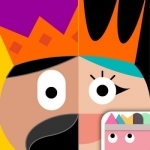
Thinkrolls: Kings & Queens
Education and Games
App
Thinkrolls Kings & Queens is an epic adventure of logic, physics and fun! Practice reasoning, memory...
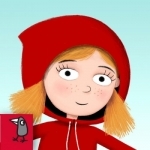
Little Red Riding Hood by Nosy Crow
Book and Games
App
* One of the App Store's Best Apps of 2013 * One of The Observer's 50 Best Apps of 2013 * One of...


